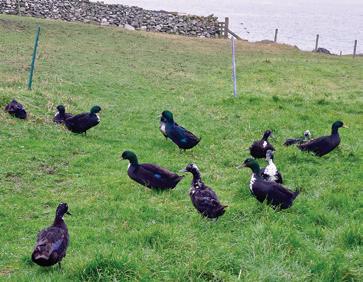
6 minute read
Braw duck eggs
Made in Scotland Duck eggs….should the ladies oblige
By Wendy Barrie Scottish Thistle Award Regional Ambassador (2018/19) for Central, Tayside & Fife Director of Scottish Food Guide
Advertisement
Many years ago, when chief inspector for another national food guide, I was fortunate to visit a beautiful mansion, generally regarded as the oldest house on Arran, at that time run as a luxurious guesthouse. I shall always remember my first encounter with duck eggs, on their breakfast menu, Duck egg omelette, should the ladies oblige. Well they didn’t oblige that morning nonetheless I had a five star breakfast and a fascination for ducks thereafter.
In days gone by, mixed farms reared ducks, hens and geese as part of the farming system, their foraging habits forming a natural cleansing of bugs and parasites, their egg production part of a healthy diet and income stream, and their meat perfect for a Sunday roast and the anticipation of leftovers to follow. Ducks’ favourite food is snails so they are invaluable for rinsing gastropods from kitchen gardens and wet pastures. They can prevent vegetables becoming snail fodder and, as snails are host to liver fluke, ducks can eradicate the risk of liver fluke from pastures ensuring the land is safe for grazing animals. Their eggs have a stronger flavour than hen eggs, their white noticeably more viscous and their richness perfect for savoury egg dishes.
My husband’s grandmother was a perfectionist in the kitchen: from butchering a whole hog for Christmas to baking bread and making cheese. I never met her




Robert& ducks at Brand Family Farm
however she appeared quite an impressive matriarch and her kitchen table must have had tales to tell. In her world, it had to be duck eggs for cakes and pancakes and I must agree, once you’ve tried them you really notice the difference. They bring a certain luxury in depth of colour and flavour to any cake or omelette and the mere act of cracking through their heftier shell and plopping the generous contents into the mixing bowl give a promise of the treat awaiting you.
Nowadays it is quite a challenge to find free-range outdoor-reared poultry and many heritage breeds are endangered. Shetland still has its Shetland geese, ducks, Tappit and Papa Stour hens, all on Slow Food’s Ark of Taste, thanks to the devoted efforts of a couple of families on Shetland but they are few and far between. In the case of Shetland ducks, their ancestors would have been wild mallards and you can still see traces in the blue iridescence in their plumage. It is important to keep these rare breeds going; not only for their beauty and eating qualities but also for their valuable genetics as these old breeds have far more resilience than many of the modern ones, often bred for one climate or one feed and much less adaptable when climate or the world economy changes our needs or affects supply chains. Native and heritage ducks, as with other domesticated rare breeds, grow slowly and can flourish on food surplus, forage in nature and live on lower inputs, making them ideal for food production in these challenging times.
For us mainland inhabitants it is good to find your own local freerange source of ducks and support them. In our case, it’s a visit to Brand Family Farm, East Fortune. Renowned for their Saddleback pigs, Hampshire Down sheep and free-range hen eggs, they are also one of a rare breed selling duck eggs from their mixed flock of Aylesbury, Khaki Campbell and Harlequin ducks, rambling around contentedly under the fruit trees. From small beginnings when they returned from a sheep mart with an unplanned handful of ducks, they now have around sixty, living the good life in East Lothian. Rearing ducks is generally less popular than rearing hens for egg production for although they provide a relatively steady supply, they are not as plentiful or consistent as hens. Thankfully this is not an issue for the Brand family as they have regular customers who adore their duck eggs and an award-winning Edinburgh chef who wouldn’t be without them and receives a regular order.
The glamorously white Aylesbury ducks may have originated down south but seem very happy by East Fortune and will lay throughout the winter months too. As the name suggests, the Khaki Campbell are a distinctive warm shade of tan, very good layers, more proficient foragers than the Aylesbury and dispatch any snails pronto. Like the other animals on their farm, they are heritage breeds and all Jane’s ducks are on the Rare Breeds Survival Trust Watchlist.
Ducks have been domesticated in the north since ancient times, long before hens, as they were easier to tame. Like geese they follow the first person they see when they are born. Us Scots have a long tradition of eating duck eggs including waders, seagulls and eider ducks although some of these wild birds taste distinctly fishy from their diet of mussels and crabs. Not so the ducks at Brand Family Larder!
Their ducks are certainly very fond of Robert, one of Jane’s sons, who makes up their daily rations and kindly guided the flock as I tried to capture a good shot. Simpler to rear than geese who need water for mating and pasture for grazing, ducks are more accommodating; happy to have a splash in a paddling pool or natural pond and roam an orchard, copse or clearing, not requiring large fields. At dusk they all head indoors to a poly-tunnel, safe from predatory foxes.
Jane and her family have enlarged their farm shop considerably since my last visit, now with an additional farm building well-stocked with local rapeseed oils from Supernature, beeswax, jams and jellies, vegetables, the neighbouring farmer’s potatoes and of course their own eggs and meats. With two newly installed freezers, their free-range pork and lamb is available fresh or frozen. Jane is so enthusiastic she is even about to launch her first on-farm market, the East Fortune Market. Reinstating a little piece of history, Jane is inviting her suppliers to join her for a monthly market, from mid October onwards.
Before heading homewards, we bought her marvellous smoked Saddleback bacon to accompany our duck eggs for a scrumptious Sunday brunch. The remaining eggs were destined for a yellowy light sponge cake. When out and about in East Lothian why not stop by another pair of ducks, Malcolm and Fiona at Ducks Inn, Aberlady - the perfect way to round off your day with a delicious meal of local produce.
https://www.brandeastfortune. co.uk https://www.ducks.co.uk
Wendy Barrie is a cook, campaigner for local sustainable food & food writer. Founder & Director of award-winning www.scottishfoodguide.scot & www.scottishcheesetrail.com. Wendy is Leader in Scotland for Slow Food Ark of Taste, a Cooks Alliance Member & Thistle Regional Ambassador. Her latest book, “Meadows: The Swedish Farmer & The Scottish Cook” co-written with her husband, Bosse Dahlgren, is available online & from selected farmshops.










